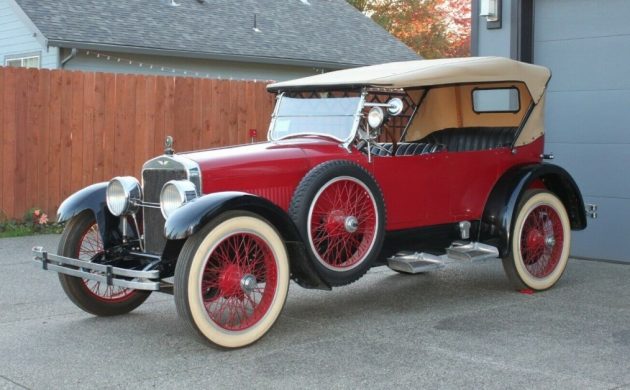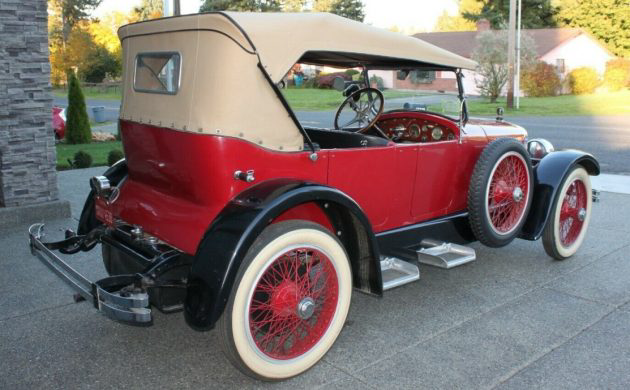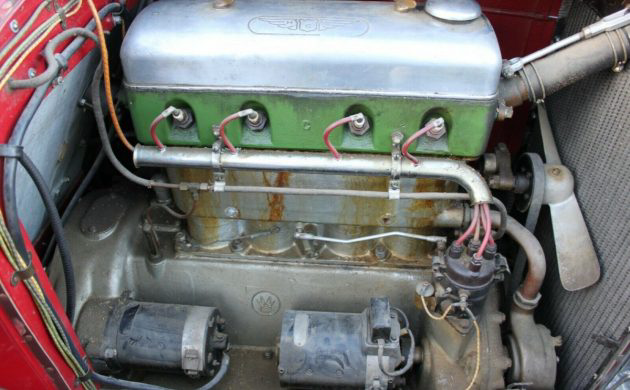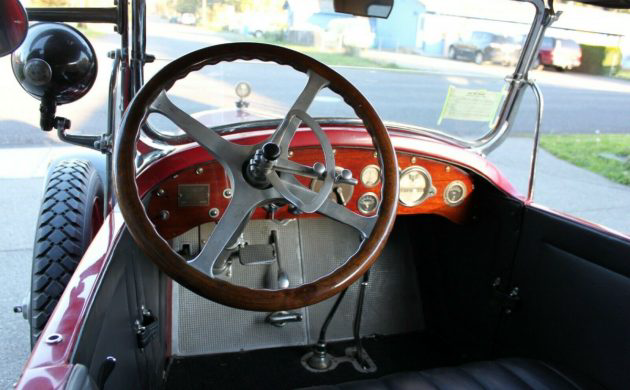H.C.S. Motor Car Company was the second auto manufacturer that Henry C. Stutz founded. In 1910, he and a partner formed the first company which would bear his name later, the Stutz Motor Car Co. It would be acquired a few years later, and they parted company in 1919 only to start another firm shortly thereafter. H.C.S. would only survive six years and produce about 3,000 cars. From the Touring Series comes this 1920 edition offered in Vancouver, Washington. It wears a restoration from 1970 but looks and runs good for its age. It’s available here on eBay where the bidding has reached $25,100, but the reserve is still lingering.
Between 1920-26, H.C.S. would offer six models of automobiles built from their plant in Indianapolis, Indiana. The pecking order according to price (from bottom to top) included Touring, Roadster, All Weather Roadster, All Weather Touring, Coupe and Sedan. The cars were powered by a 4-cylinder engine capable of 50 horsepower. No doubt with modifications, driver Tommy Milton drove one of the machines to victory in the 1923 edition of the Indianapolis 500.
The seller’s car is likely an early production model from 1920. Where it was between 1920 and 1970 is unknown, but the car was restored 51 years ago and found its way to central Oregon. It must have been in storage for another 35 plus years before being discovered in a barn three years ago and brought back to life (we don’t know what work that entailed). The seller says it runs and drives fine but wouldn’t suggest taking it out on a freeway (I wouldn’t either). It has a 3-speed manual transmission which must be double-clutched to go through the gears. We understand that’s not something to be alarmed about.
This 101-year-old car looks gorgeous and something that should be preserved as best as possible. It only has a reported 10,000 miles on it which is anyone’s guess as to whether that is correct or not. Since these cars aren’t offered up for sale very often, what’s this Touring Series 2 worth? Well, there’s a roadster in Tampa online right now for $59,000 if that’s any gauge and it looks to be in a comparable condition.








This is a nice looking 1920 HCS which is a full classic per the Classic Car Club of America. The overhead valve engine was supplied by Weidely Motors and displaced 221 cu in developing 50 bhp @ 2500 rpm. A handsome, desirable and usable “veteran” motor car.
An HCS did not win the 1923 Indy 500. Tommy Milton won the 1923 500 race in the HCS (sponsored by Harry Stutz) Special driving a 122 Miller after qualifying with 4 laps at 108.17 mph average. In the same car Milton set a new world’s record for the Syracuse one mile dirt track that summer – 42.28 seconds at 85.14 mph. The Miller 122 cars were superb series production race cars developing 120 hp at 5000 rpm.
There were six Miller/Miller (chassis/engine) two liter 122 race cars in the top 10 out of 15 entered in 1923.
The HCS was an expensive high quality car, but not a race car nor basis for a top flight special.
That’s usable “Vintage” motor car not “veteran”.
That’s usable “vintage motor car” not veteran.
The lack of running boards instead using step plates for entry was a style uncommon in 1920. Loos a bit sporty for a touring car.
I thought Weidely Motors went bankrupt in 1917. ??
Nice history lesson. The car has survived longer than most people. I doubt there’s a living soul left that saw one of these when they were new. Biomechanical machines are now being built so that someday living machines will outlast people and cars. Strange but true. Case in point is a biomechanical kidney that has been developed for kidney patients.
God bless America
Am I the only one that noticed the fan belt doesn’t drive the water pump and generator? It appears they are driven off the camshaft as I’m sure the distributor is. Is that correct?
Perhaps, but it looks to me like since all are connected by shafts and the ultimately connected to the bell housing they might all be driven off the flywheel. If one fails they all could fail.
God bless America
This is very common on brass cars, the magneto timing is based off that shaft. My ’11 Buick water pump has stuffing boxes at either end (like a boat propeller shaft). adjusting the timing with this setup is not for the faint of heart.
Surprised to see this on a 20’s car tho
This car has thermosyphon cooling system which relies purely on the the water cooling and falling and the water rising when heated and the heat transfer to the air from the radiator
these were anemic in relation to a “real” stutz. The motor put out far less hp.
Nice car, but certainly not a stutz.